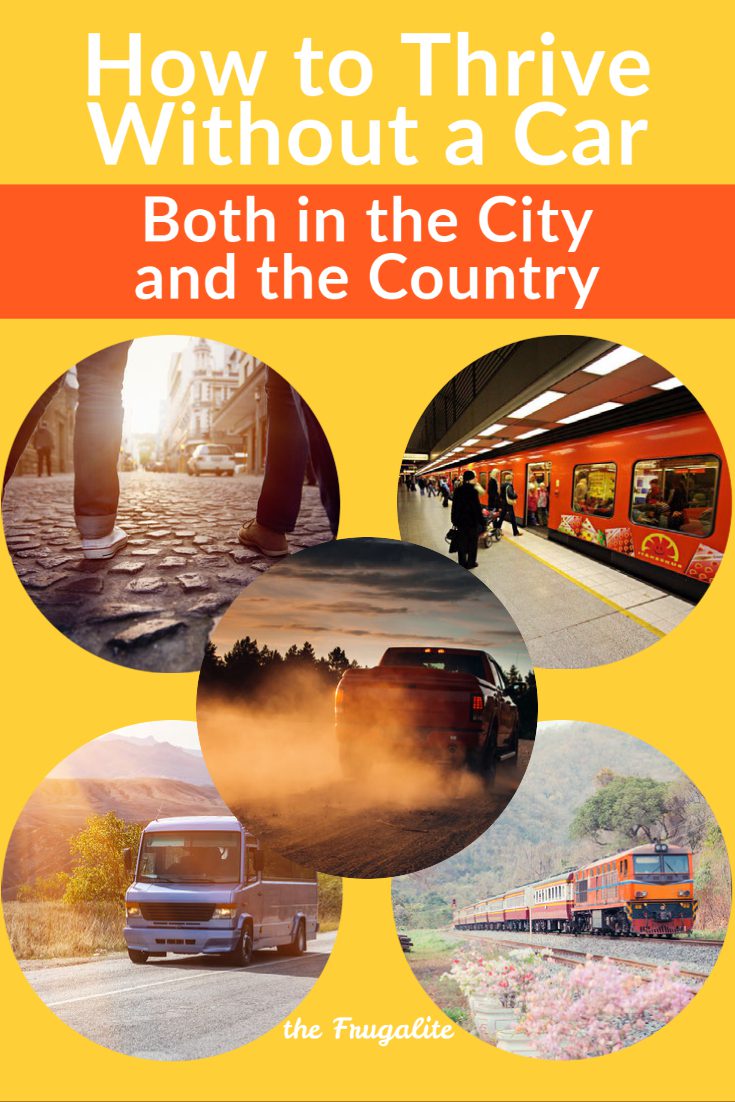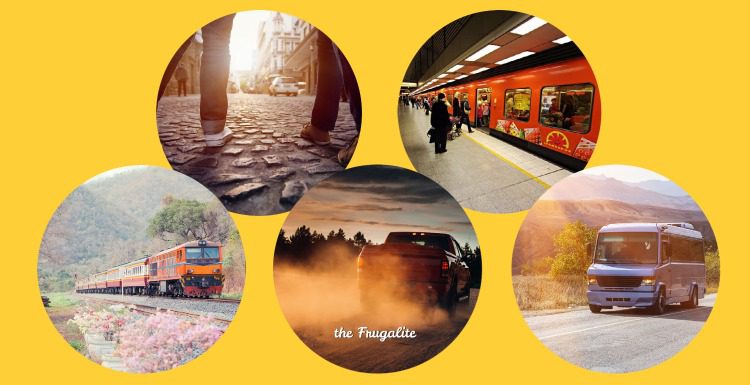(Psst: The FTC wants me to remind you that this website contains affiliate links. That means if you make a purchase from a link you click on, I might receive a small commission. This does not increase the price you’ll pay for that item nor does it decrease the awesomeness of the item. ~ Daisy)
Most of my adult life, I had to learn how to thrive living without a car both in the city and the country. I am 52 and have only owned a car for around a total of 10 years. Right now, I live in the country. However, I have lived many years in cities of varying sizes. As it is quite different to live without a car in the country compared to the big city, I will discuss both.
While it may sound nearly impossible, if times are tight, give it some serious consideration. You can save the money of a car payment (if you have one), car insurance (which you must have), parking, and the ever-increasing costs of fuel and maintenance.
Living without a car in the city
There is no question that living without a car in the city will save you money. You don’t spend on the car and the insurance or the expensive parking. When I lived in the city, it was enough to be paying city rent, never mind the car. As well, it can be easier to go without a car in a city. In most cities even of a modest size of, say, 20,000 people, there is some public transportation system. Smaller cities or towns generally have a bus system. In larger cities, you will have the subway system, too.
In my city years, I had many creative solutions for getting around. First, I would walk wherever I could: I tried to choose a location to live where I could walk to the grocery store. (Yes, I had one of those foldable grocery carts to make it easier.) For longer trips, for example, to my classes, I would rollerblade. (Yes, I was younger, then.) No, I would not even consider rollerblading on busy city streets now!
When I could afford it, I bought a monthly subway or bus pass. As time went on, this became a tax credit, so there was a benefit there. Sometimes, though the pass was too expensive. I would only use a bus or subway token when I absolutely needed it. Before, there was a policy that you could step on and off the system until your transfer expired. This meant that I could stop to run quick errands, like grab a few groceries on my way home from work for no extra expense. This really helped me keep my spending on transportation low.
What if I need to get out of town?
I have always loved the train. We have a pretty good city-to-city train system in our province in Canada. Sometimes, however, I was going where the train just didn’t go. Then, I would rent a car. I would develop a relationship with one local rental agency. As I rented fairly regularly, I was offered a “business” rate by one agency. At another, I got a deal where you would rent a few times and get a free rental. One time, the car I had reserved to go to a friend’s wedding wasn’t available: they upgraded me for free to a Candy Apple Red brand new Mustang. That was a fun drive, to say the least!
Eventually, a car-sharing program came right to my neighborhood, in fact to the parking lot of my apartment building. I bought a membership immediately. The car-sharing program opened up many possibilities for me. Finally, I had a way to buy and return home with large items or go for a big grocery shop. The car-sharing program gave me a great deal of freedom and flexibility.
Living without a car in the country
I now live in a rural area pretty much in the middle of nowhere. It is more difficult to thrive and live without a car. There is no bus, no subway, nothing within walking distance. The road I live on has no paved shoulder. It is traveled by huge dump trucks and transports. I would not ride a bicycle on it for fear of my life. Although my work is nearby (around a seven-minute drive), that is 10km away. For all of these reasons, I choose to have a car.
However, I have a friend who is thriving without a car. How does she do it? We have a wonderful local bartering network. My friend works seasonally, and her work is just down the highway from where she lives. When she needs a drive to work, she has been able to get one from the bartering network. In addition, rural employers out here are more accustomed to having workers who don’t have cars. Her employer would often give her a ride home. On the farm where I work, good employees are hard to come by. My employers would sometimes drop one of our young workers off at home after work.
In addition, in a small-town community, co-workers are often willing to drop someone off on their way home. This happens where I work on the farm, where a guy without a car was hired and he would only work shifts with his friend who drove. Another example is a young worker with no car who is dropped home regularly by a co-worker.
People living without a car in rural areas don’t ONLY need to get to work
The bartering network also provides help for people without cars who needed to go other places. Sometimes when I was heading down to the nearest town (around a 25 minute drive), I would take my friend with me. She would be able to run errands and go grocery shopping with me. The bartering network would help drivers willing to do this with a gift card for gas. As I had lived most of my adult life without a car, I knew what it was like. I enjoyed driving people different places, such as medical or legal appointments, or taking someone to volunteer work that they really enjoyed.
You will also see a lot of kindness towards neighbors in rural areas. Here is one example from our locale. My elderly aunt, who is 82, helped a woman without a car work in the next town about 30 minutes away. This woman was an immigrant working hard to try and launch a business. She worked in the tourism industry on a tour boat. My aunt would drive her pretty regularly to work, although sometimes the captain of the boat, coming from a nearby town up the highway, would also drive her.
While living without a car in the country might seem like a daunting idea, I hope that I have shown how the close knit nature of the small town community can really help to bridge this gap.
Have you ever tried living without a car?
“Car” you with us?
Do you currently own a car? Do you live in the city or the country? Could you see yourself trying any of the thrifty tips offered here for living without a car? Do you have a tip you can share with us? Please tell us in the comments below.












20 thoughts on “How to Thrive Living Without a Car Both in the City and the Country”
I live 15 miles from the nearest anything so walking isn’t an option. But I’ve lived without a car for a year now. My daughter comes once a week to take me to the grocery store and I order online for everything else.
Hi Tami, Thank you so much for sharing! You are a great example of thriving without a car in a rural area. How Frugalite of you!!!
I’ve lived in a city without a car for 15 years and saved thousands of dollars. However, with the utter insanity of people and masks on public transit is making it very unsafe for us free breathers to use public transit. I’m getting a car.
Hi M, Good for you for all of those savings over the years! I empathize about what it must be like on public transit in a city now. I wish you the best!
Well, here in the United States, good luck finding any kind of bus system in towns under, say, 100,000 people. It’s a little different than in Canada. While I’ve lived without a car before, I was in a city of over 300,000 people and could take the bus or do the occasional rental car, at least until I could afford to purchase one. My elderly mother lived in Philadelphia for about 50 years (until I moved her recently), and got by without one, using the bus or walking when she could (and yes, with that foldable grocery cart you use). Unless you had a network of people (friends, relatives, cooperative neighbors) who could give you a ride, I would strongly recommend against living in the country here without a car.
Hi Jim, Thanks so much for taking the time to fill me in on what its like in American re: public transit. This is exactly why I specified populations and tried to give some examples. This will be helpful for others wanting to get a sense of what things are like across the border. Much appreciated!
The town I live in only has bus service from about 6am to 6pm, Mon – Sat. No service on Sundays. For those who go to services or those working off day shift, bicycles, walking, or cab services. I will admit I like UBER and delivery services. Used to be two cab companies, one which only did medical calls, so really only one cab company with maybe 4 drivers. They tried, but couldn’t keep up, which is probably why UBER works so well.
Hi Sally, Thank you for updating this thread with the UBER idea! I have to admit, it didn’t exist when I last lived in a big city. i know many many people use these services. I was not aware they were using them in a smaller city, or one with limited bus service. Thanks for sharing this; you’ve made a great addition with this!
Glad it works for you. It’s difficult to imagine being without vehicle transportation. The thought of depending on others (all the time) for what I consider a Basic Need, is downright scary. I live in the country, in Texas. When thinking of all I use my vehicles for on a mostly daily basis, it would be quite difficult and possibly more expensive to not have them. I am thankful to have a small suv and a big old truck for all our needs. This is a hard NO for me.
Hi Linda, I love hearing from a wide range of readers on a topic. I appreciate your perspective. I think everyone’s context is different. Not having a car certainly wouldn’t work everywhere. I agree that there would be a feeling of dependence, and the degree to which there was mutuality in the relationship could offset that, but it does depend. Thanks for sharing your comments with the community!
There’s another downside to ditching one’s wheels that worth mentioning in these very uncertain times. When Bob Wells realized that his divorce settlement precluded any possibility of maintaining two separate houses, he moved into his van and has lived as a nomad ever since. His 2013 book titled “How to Live In a Car, Van or RV … and get out of debt, travel, & find true freedom” encapsulates his position. Besides owning his CheapRVliving.com website, he has one of the most extensive and long running YouTube channels about the whys and how-tos of vehicular nomadic living — also called CheapRVliving.
In another sense this is not new in history. The so-called European gypsies Spent many hundreds of years being chased through country after country even long before Columbus sailed the ocean blue. [Side note: the name gypsy was slapped on those nomads after a long time of living in Egypt.]
Today we have the bizarre circumstance of the US government in combination with mainstream media and the mega-corporations using the Covid-19 issue to destroy small businesses and peoples’ careers with vaccine mandates that threaten to cripple or kill the human guinea pigs of all ages. If saving one’s health or even life in the face of mandates means losing one’s ability to pay a mortgage or rent, then moving into a vehicle and going full blown nomadic may be a far better choice than living under a bridge without wheels.
Even before the Covid-19 issue emerged, the number of people living in their vehicles in California (because the cost of housing went out of sight) has long been in the news.
So whether for reasons of economics or political wars of medical tyranny, the option of living in one’s vehicle (whether car, SUV, truck, van, RV, converted ambulance, or whatever) is a legitimate Plan B to have available (including the how-to knowledge that takes time to acquire) … even if one is fortunate to never need to use that option.
–Lewis
Hi Lewis, Indeed! Who would have imagined times in which one’s vehicle represented a legitimate Plan B for housing? However, with your usual well-researched thoroughness, you have made a sterling argument here for the car as a potential housing unit. My goodness, I sincerely hope it doesn’t come to that for me. I’m not sure I would sleep well in my current Toyota Corolla, or that my sensitive back could handle it. However, if it should come to that, I would definitely see the benefits of my car compared to under the bridge. Thank you for taking the time to make this important point for all readers.
I gave up driving in 1982 and haven’t looked back! There are many ways to get around. As Collette mentions, walking is a great way and I too own one of those wire hand carts for groceries. I’ve gotten into bicycling this year and I enjoy a nice ride; my city has bike lanes, which is helpful. I keep that close to home however, being older myself. I also work from home for the past 20 years. Very helpful!
One thing not mentioned in creative use of cab fare. Cabs are expensive but I too like to breathe, so no thanks to the city bus. Most of the cabbies don’t give me that kind of grief. So I schedule my trips to maximize my investment. For example, my dentist is in the same strip mall as a huge grocery store. So I plan a huge shopping trip for the same day I see my dentist. Then I only need fresh stuff for quite awhile, ie bread and milk, easily available from the neighborhood store. Another major local store delivers for about half what cab fare would cost, so I use that option too. And if I need a quick ride I do have friends, thankfully.
When I lived out in the country people were very kind. I’d often get a call from someone heading into town and asking if I’d like to go along. In college I bought a bus pass every month, which more than paid for itself between classes, work, and errands. And I walked home in the snow and cold many, many times. Dress for it. Walking is good for us!
Great article Collette!
Hi Jayne, Thanks so much. I did seem to recall that you had mentioned you lived without a car. I’m so glad you took the time to ad these valuable tips. I had owned a bicycle when I lived downtown in a city of about 4 million. It gave me something wonderful. There was a waterfront park on the lake within a 20 minute bicycle ride. I would pack a snack and ride to the park pretty much every weekend. There was a large hill at the end of the ride. i would barrel up there and then enjoy a stunning view while I drank tea from my thermos and listened to the sound of the waves crashing. Priceless! On the way home, I would often buy a few groceries and put them in my backpack. Great memories. I didn’t use cabs much. I am so happy you have added these tips to our resources for readers. Much appreciated!
I’m 15 miles from a small rural town. No relatives around at this time. So I own an old yellow cab and a pick up. The truck came with a now dead husband so all it’s cost is a very little up keep and insurance. The yellow cab was from when the city over 50 miles away was getting rid of its cab company 4 yearsago. I paid $725 for a well maintained high mileage car with good tires, a new driver’s seat, and newer motor. A new battery and alternator have been the extent of the maintainance. To get around I needed a vehicle. For the100 mile move back to my 3 acres 6 yearsago I was grateful for the truck. I haul in grain for the critters 400 lb at a time and heating pellets 2000 lb at a time from the city. I burn close to 2 pallets of pellets each winter in a gravity fed rocket stove where I also cook all winter.
To get to church 20 miles away I need a vehicle. To haul home groceries 2 times per month in canning quantities I use the truck. I’ve combined picking free apples and pears from yards in town with shopping trips. I combine trips to the city so I pick up free Craigslist materials with doctors and dentists, visits.
I’d picked up an older class c motor home for trips with my husband. I’ve ended up using it as a guest cottage. I live in a 1 bedroom, 1 bath mobilehome. A recently widowed son will be living in the motorhome while rebuilding his mobilehome here on my property. I don’t license or insure it any longer. It’s still drivable. It could be licensed and insured.
We can’t legally burn trash and there is no trash hauling company here so once a month i haul off trash to a transfer station 6 miles away.
I still have one of those folding carts I used for groceries and laundry when I lived in the city. I no longer use it. I have 2 wagons, a flatbed cart and a gas golf cart I use working here on my property. At 74 I don’t walk around carrying 40 lb bags of feed anymore. I paid $300 for the golf cart with my feet in mind. I have peripheral neuropathy (not diabetic) so walking very far isn’t working and I still have critters to care for. I can even drive the shoulder of the road to go for mail at our rural post office.
I pick up cheap vehicIes to rebuild. I currently have 3 about ready to go. An older Isuzu Rodio will be a gift for a married son when he moves back from out of country. A 2005 Prius with a newly rebuilt battery pack that will be my go to church and grocery trip car. And a Ford Ranger pick up needing a rear bumper and a drivers door opening mechanism. I haven’t decided if I’ll sell it or give it to a grandson. I’ll sell the yellow cab with the police interceptor engine- lots of power but terrible mileage. The Prius gets 50 MPG. My F250 4×4 will be the heavy hauler I’ll need as long as I need heating pellets and any critter feed I’m not growing.
Being without a vehicle doesn’t work for me. I’m retired but busier than ever. When my sons are back i suppose I could get a ride with one of them but I like my independence. And they aren’t hauling a ton of pellets at time in their vehicles. And my truck will be the “moving van” for the move from the city to the country. My 16′ flat bed trailer with used lumber sides will be put back to work again.
Since two sons are moving back here- I suppose I could get a ride sometimes… when I’m old and retire from driving. 🙂
In the meantime I have a solar array to install and that Ranger to work on. The sun isn’t up yet and it’s time to get breakfast and get busy.
Dear Clergylady, God Bless You! What a wonderful picture of your life and how you use your vehicles you have shared. I am certain I will re-read it many times to take in all of the tips and information. I am on my own in my fities, living in a rural area. I love your independence and how you work around any challenge that you face. All the details you have offered give a vivid picture of your rural life. Wish I could invite you over for tea. You are truly an inspiration. Thank you for taking the time to share before your breakfast. Wishing you a productive and wonderful day!
Almost 25 years ago my husband had a job assignment in England; we lived there for about 7 months with no car. The job had been offered to him with the understanding that we would be provided a car, but the project manager changed that. When we were looking for housing, we knew we had to choose a place near a train station or bus stop. The town (20,000 population) had 2 train stations, several bus routes and quite a lot of taxis. It really put to the test the idealistic blatherings of my youth about the beauty of public transport. I loved the trains and we used them whenever possible, as well as the black London taxi cabs. The buses were a different story. Once in the winter we were standing at the stop and it went right on past us. I was so mad, I took a taxi to the bus headquarters and lodged a complaint. My husband rode the bus daily to work in the next town. The rent house we chose was at the top of a steep hill, about 2 blocks up from the bus stop. There’s nothing romantic about waiting out in the dark, cold and rain for a ride.
We tried walking as much as we could, but it got to be too much. The nearest grocery was 1/2 mile away. I only walked there once. Then I started using the bus, but lifting the loaded cart up onto the bus ruined my rotator cuff, so I compromised. I rode the bus to the shopping area on High Street and took a taxi back, which worked much better. I remember wanting to go places that the trains/buses didn’t go and the longing for our own car. When we moved back to Texas, the feeling of freedom to be able to get in the car and go anywhere I wanted was wonderful. Now we live just 3 miles out of a very small town, but walking is out; arthritis prevents me from walking more than about 50 feet, and it’s far too hilly to ride a bicycle, even if I could. There are no buses, taxis or ubers out here. My husband has health problems and I’m doing all the driving for now and with the price of gasoline going up and up, it’s getting costly. For a long time, I’ve tried to combine trips to save gas, but we aren’t able to do more than 1 or 2 things per trip now. One of our sons lives in a cabin on our property and he runs errands, does some shopping for us and will drive us if we ask him.
I’m not looking forward to giving up driving, but it’s much less onerous than when my elderly mother stopped driving. So many things can be purchased online and delivered.
Reading back over this sounds very complain-y and for that I apologize. My husbands co-workers who didn’t mind not having a car were all young, and if we had been, too, might’ve seen it as an adventure.
This is an excellent blog and the comments are as good as the articles. Well done!
Hi Carla, I so enjoyed your comment. When that cruel bus went past you, I felt it. When you took the taxi to bus headquarters, I was with you 100%. I have spent many long waits at bus stops…..in Canada these waits can feel endless in the cold winter months. To be honest, i didn’t find your comment complain-y…you have shared some of the ups and downs of being carless abroad, and having a car in later years. i think these are valuable perspectives to share with our readers. You are quite right about the value of the comments: As a writer, I can’t wait to see what people respond with. This is a wonderful community and people are so generous with their time to share their thoughts, including YOU!!! Thanks very much.
I love ve in the no where it’s about 30 my nutes nearest to town the left cal neighbors aren’t very hel gul..I don’t have a car and bring to get my love scenes back u have work but I can’t get there.way to far to walk or ride a bike .so what do u suggest I do
Hi Dawn, Yes, it is much more difficult to live without a car in the country. I don’t know the specifics of your situation. What folks do out here that don’t have a car: some work at the same work place as friends so that they can catch a ride with them. There was a guy who worked at the same farm as me. He was couch-surfing between his mothers and a friend’s place. He didn’t have a car, but he came with his friend who also worked on the same farm. He was an excellent worker.
One idea I have is to contact all local churches to see if they have a ride program or drive volunteers. I have a friend who had to give up her car. She worked way down the highway, around a 15-20 minute drive. The local church volunteers would give her a lift to work and then the store owner would give her a drive home. That was true on the farm I worked on, too. They needed workers so badly. There was a young lad in the nearest village. The owners would drive him home and sometimes pick him up, too.
Another idea is to work from home. Could you bake at home and sell it to the nearest cafe? A local lady does that here. Could you make some handicrafts at home and then sell them at local shows or at your own farm stand at the end of your road? You could be working every day on your sewing or other items and then sell them at shows. That would require some help with a car. Again, often local churches or friends are willing to help.
I know that it’s not easy. We can all just do our best with what we’ve got. I find that it often has a way of working out in the end. I wish you the best!